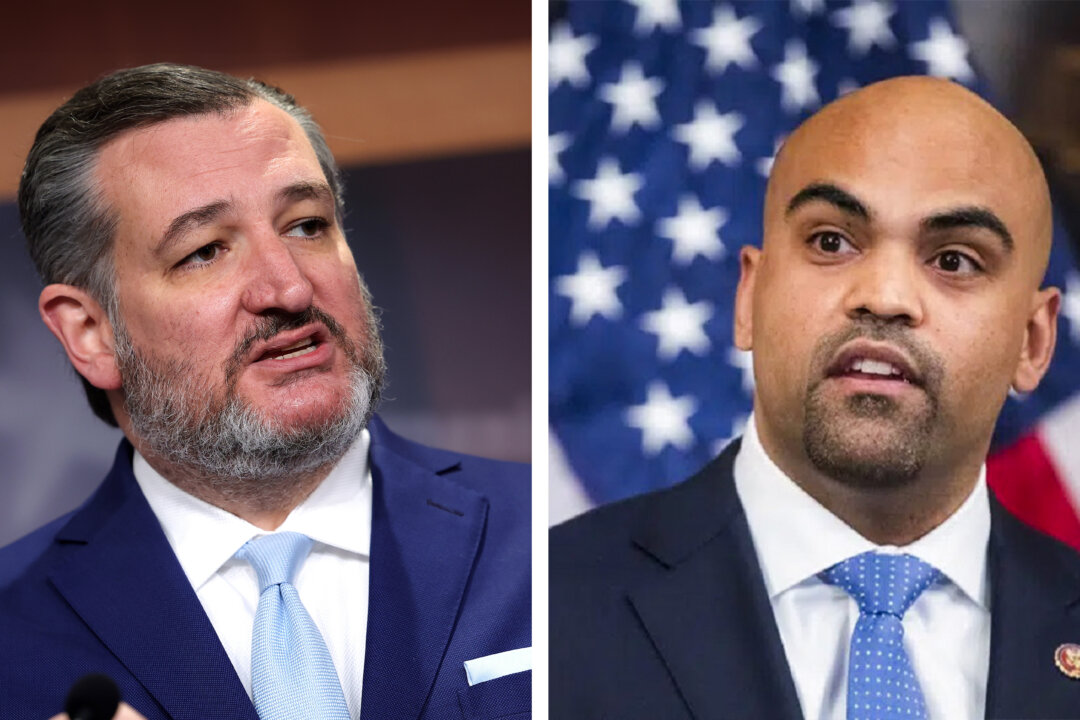Cruz’s win was essential in the Republican bid to control the Senate.
Sen. Ted Cruz (R-Texas) fended off Democrat challenger Colin Allred to keep his Senate seat in a hotly contested race, a crucial win in the battle to control the Senate.
The Associated Press called the race at 11:39 p.m. ET. With this win, the GOP looks poised to retake control of the Senate. It has won 50 seats and needs just one more to regain the chamber.
“Texas will remain Texas,” Cruz said to a packed room after the race was called in his favor. “Texas can’t be bought.”
Cruz noted a strong Latino turnout for Republicans in Texas, predicting a “generational change.”
Cruz was leading Allred 54 percent to 43.9 percent, with 84 percent of the vote counted as of midnight ET, according to The Associated Press.
Democrats have long dreamed of flipping Texas blue, though a Democrat has not been elected on the statewide level in 30 years.
The Republican victory dashed Democrats’ hopes of picking up a Senate seat in Texas or Florida, both of which Democrats viewed as vulnerable for a pickup.
Flipping Cruz’s seat would have helped Democrats maintain control of the upper chamber, where they hold a 51–49 voting majority.
Republicans are favored to take control of the Senate.
West Virginia was earmarked as a Republican shoo-in after Sen. Joe Manchin (I-W.Va.) decided to retire. The GOP needs to flip just one more of the seven competitive seats held by a Democrat or an independent to gain a majority in the chamber.
Republicans set their sights on seats held by Sens. Jon Tester (D-Mont.) and Sherrod Brown (D-Ohio), both three-term incumbents.
Keeping Texas red was essential to holding a Republican majority.
Allred’s defeat marked the second time Democrats have tried but failed to flip Cruz’s Senate seat, despite pouring tens of millions into the campaign.
Democrats have viewed the Texas seat as vulnerable ever since Democrat Beto O‘Rourke ran a surprisingly close race against Cruz in 2018. O’Rourke lost by less than 3 percent to the incumbent senator.
Cruz has benefited from a solid victory in the state for former President Donald Trump. The former president had taken nearly 57 percent of the Texas vote to Democrat candidate Vice President Kamala Harris’s 42 percent by midnight ET.
Abortion and the border were the primary sparring points between the two senate candidates.
In his closing argument to voters, Cruz focused on securing the border, reducing inflationary spending, supporting Texas oil and gas, supporting police, and barring gender-confused boys from competing in girls’ sports.
Meanwhile, in multiple ad runs, Allred hammered Cruz for supporting abortion bans. Ads also criticized Cruz for leaving the state for Cancun during a disastrous winter storm in February 2021.
Allred supported securing the border, which was a change from his previous position. He also favored a pathway to citizenship for illegal immigrants who are “working hard and obeying the law.”
He also favored “gun violence prevention” and green energy with “responsible oil and gas production,” while vowing to protect social security for seniors.
During their only debate in October, Cruz, who has long aligned his border position with Trump, sought to portray his opponent as flip-flopping on the issue, along with Harris, who switched her position recently and promised to clamp down on the border.
Allred attempted to tie Cruz to the Lone Star State’s abortion ban, although it is a state issue that neither candidate can control.
Cruz fell back on Trump’s position during the debate, saying that abortion legislation should be left to the states.
Allred denied being in favor of transgender students playing on girls’ sports teams, which many Texans oppose.
However, Cruz pointed out that Allred voted for the Equality Act, noting that it allows male students to use the same restrooms and locker rooms as girls.
Allred defended his vote, saying he was concerned about protecting the rights of all students under the bill, which would amend civil rights laws to prohibit discrimination based on sex, sexual orientation, and gender identity.

